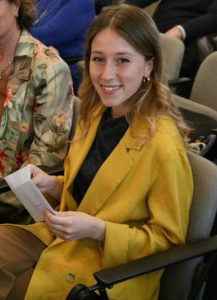 Martina Abbondanza is a PhD student in Psychology, Linguistics and Cognitive Neuroscience at the University of Milan-Bicocca under the supervision of prof. Marco Marelli and prof. Francesca Foppolo.
Martina Abbondanza is a PhD student in Psychology, Linguistics and Cognitive Neuroscience at the University of Milan-Bicocca under the supervision of prof. Marco Marelli and prof. Francesca Foppolo.
She obtained her Master’s Degree in Linguistics at the University of Padua, with a thesis about the influence of the syntactic structure on the reading performance of neglect dyslexic patients. Her main concern is the relation between language and the other cognitive abilities (attention, number cognition, memory).
Her PhD project aims to explore how some kinds of words are mentally represented in spatial terms.